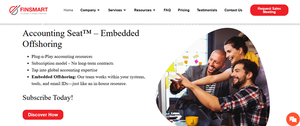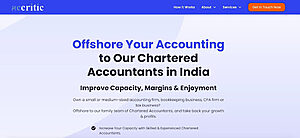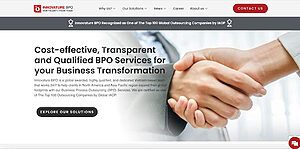“We used an offshoring partner in the past, and it didn’t turn out well for two reasons: employee turnover and time zone differences.
They had massive turnover frequently, and I had to explain my SOPs to new employees on a regular basis.
Secondly, they scheduled our meetings for the start of their day, which is 9 or 10 PM in my time. It didn’t work for me.”
—Elizabeth Bergen, Owner of Foray Business Group
Although so many CPAs, CFOs, and accounting firms are enjoying the benefits of offshore accounting, there are so many ways you can get it wrong, like Elizabeth did (before finding Finsmart Accounting).
In this article, we’ll show how to hire offshore employees for your accounting firm so that you won’t sacrifice your time, money, and convenience on an offshore accounting partnership that won’t work.
What Is Offshore Hiring in Accounting?
Offshore hiring is sourcing talents from another country to handle your accounting tasks.
These talents could work with you independently or through an offshoring partner.
The Difference Between Outsourcing, Offshoring, and Nearshoring
First, these all involve transferring work to a third-party professional to lighten the workload for your in-house team and leverage external expertise.
Outsourcing is hiring these third-party accounting professionals within your country.
Offshoring is hiring these third-party accounting professionals in another country. This is what many call “moving” operations abroad.
Nearshoring is hiring accounting professionals from a country in the same region.
Why Offshore Hiring Is Booming Among Accounting Firms
If you speak with firms hiring accounting talents offshore, most will point to one or more of the following as their motivation:
- Cost Efficiency: Since accounting work can be done from anywhere, most firms are going after offshore hands who can get the job done to standard at a more affordable rate.
Plus, no full-time hiring saves them from worrying about employee benefits, payroll taxes, etc.
- Talent Shortages: Why are accounting talents changing careers? Pay rise, work/life balance, or some other factor?
It could be a combination of both, but the point is that they are leaving, and that leaves a vacuum, a lot of client work that needs attention.
Why insist on local accounting professionals when there are enough qualified hands abroad?
We’ve been working directly with Finsmart’s Amuda for about 2 years, and she’s been a great part of our team. She’s really helped improve our efficiency, especially with the bookkeeping tasks that bog us down every day.
Looking forward to what we can eachieve together, and we’re glad that we were introduced to Finsmart Accounting.
Kellie Work, CPA, Pittsburgh-based CPA with Collins & Ganley, P.C
- 24/7 Support: For many people, the time zone difference is a deal breaker because it threatens real-time collaboration and work handoff.
But on the flip side, this time difference makes you available for client service and support around the clock.
This means that as one team is ending for the day, the other is just starting theirs, allowing for a continuous flow of work in your firm.
Who Should You Hire Offshore?
Generally, accounting firm owners, CPAs, and CFOس prefer to keep their senior roles local. It helps with quick decision-making.
Other than that, any accounting role can be filled with offshoring hiring, including:
- Bookkeeper: records your client’s daily financial transactions and keeps their books tax-ready.
- Internal Auditors: Ensure your client’s financial processes are transparent, their risks well-managed, and staff completely accountable.
- Tax Accountants: They are proficient at filing your client’s taxes (to claim all available tax credits) in line with IFRS, GAAP, or another applicable accounting framework.
- Accounts Payable/Receivable: They’ll manage bills to ensure timely payments (and maintain vendor relationships) and track collections to improve cash flow.
- Payroll Specialists: Trained to handle volumes of data to ensure prompt payment of salaries and filing of payroll taxes.
- Financial Analysts: They are proficient at analyzing financial data to provide insights that improve your client’s profitability.
Direct Hire vs. Partner Firm: Which Is Better for You?
Reputable offshoring partners provide dedicated accounting human resources to firms using their wealth of local and industry experience.
Their accounting talents are put through rigorous professional and security checks to ensure that they don’t only meet client deliverables but also protect the client information they work with.
Finsmart Accounting, for example, uses workspaces with strict security protocols and requires their staff to have relevant security certifications.
Additionally, we take care of the legal and logistical requirements of using our offshoring resources. This frees you up to simply enjoy our plug-and-play service without worrying about employee compensation, benefits, etc.
With Direct Offshoring, your offshore employees are directly accountable to you. This sounds great until you remember that it also makes you directly responsible for their data security measures, which can increase your administrative work.
The Offshore Hiring Process: Step-by-Step
Step 1: Define Your Needs
You need to be clear about your firm’s accounting needs, but you can go beyond that to define the performance standards, communication frequency, and every other work-related expectation you have for your offshore employees.
Missing this can result in having round pegs in square holes.
Step 2: Choose the Hiring Model
This is where you decide how to source the offshoring talent, and you have two options here.
You either hire them directly or partner with an offshoring company. Offshoring firms usually have a pool of trained and certified professionals with expertise in your accounting domain.
Usually, these offshoring firms have a reputation to protect, so they’ll use every resource at their disposal to ensure service quality, provide great client experience, and win your trust.
Step 3: Select Country (and Provider)
With variations in labor cost, language proficiency, accounting expertise, and time zones, any country you hire employees from can determine your particular experience.
No country has it all, but knowing their strengths and weaknesses should inform your choice, considering your firm’s offshoring needs.
Step 4: Interview and Assess Candidates or Partner Firms
The main difference between interviewing for onshore and offshore hiring revolves around data security and cultural fit, and that is where working with offshoring firms (instead of hiring directly) helps.
Accounting talents from offshoring firms have already scaled through rigorous skills and personality assessments, which take care of some of the screening for you.
Whether you’re hiring directly or partnering with an offshoring firm, ask about their security certifications and protocols to ensure your client’s data is safe in their hands.
Other tips for an effective interview include:
- Make them comfortable: The fear of rejection alone can make the best of accounting talents fumble in an interview. Making your interviewees comfortable can help you identify suitable talents.
- Implement skills test: While they might have been vetted by your offshoring partner (if you’re using one), it’s probably best to test their technical abilities yourself.
Here, you can give them a bookkeeping, tax, or payroll assignment to evaluate their hard and soft accounting skills. At the end of the day, the more technically able the talent is, the less training they’ll need on the job.
Step 5: Sign Agreements
When all parties are aligned on the services, scope of work, delivery timelines, fees, and confidentiality requirements, you can sign the proposal and engagement letter to kickstart the working relationship.
Step 6: Onboard
This is where you help the offshore accountant ease into your culture, workflows, and technology.
You don’t have to do this in one day. You can spread it across weeks until they’re fully integrated into your work systems.
Philippines vs. India: Where Should You Hire Offshore Accountants?
-
Cultural Fit
The work ethic in the Philippines is more similar to Western work culture, but that does not take anything away from the Indians.
That is why American, Australian, and UK firms are 65% more likely to work with Indians than talent from other offshoring countries.
-
Language
Generally, the Philippines have a stronger command of the spoken English language than Indians. But that only matters a little.
Reputable Indian outsourcing firms (like Finsmart Accounting) prequalify their workforce for language proficiency. This ensures that the average Indian offshore employee is more than capable of communicating exceptionally clearly.
-
Time Zone
India and the Philippines have two-and-a-half hours between them.
The Philippines is between 12 and 13 hours ahead of the United States of America (USA), seven hours ahead of the United Kingdom, and two hours behind Australia.
India is 11:30 minutes ahead of the United States of America (USA), four-and-a-half hours ahead of the United Kingdom (UK), and four-and-a-half hours behind Australia.
-
Cost
While the Philippines and Indian workforces are affordable due to their cost of living, India’s rates are lower.
Plus, the Indian population is more than that of the Philippines, so more Indians are ready to work. This higher supply of labor (versus the demand for it) also contributes to the affordability of Indian talent.
5 Trusted Firms to Hire Offshore Staff in 2025
1. Finsmart Accounting

Finsmart Accounting is an offshoring firm that helps accounting, bookkeeping, and CPA firms in the United States, the United Kingdom, Australia, Etc. to fill the gap in accounting talent shortage.
Its Indian accounting professionals have studied accounting up to CPA levels and are trained to integrate seamlessly into your team, learn your processes, and deliver results as quickly as possible.
Pricing
Finsmart Accounting offers a subscription model through the innovative Accounting Seat model, helping you understand the cost of using its services from the start.
Its services are priced as follows:
- Dedicated Seat: $2600/month for a dedicated resource at 160 hours per month
- Hourly Seat: $20 per hour
- USA Tax Seat: $3000/month
“The Finsmart team can work with any software you have. QuickBooks Desktop, QuickBooks Online, Xero, Bill.com, you name it!
Another good thing about Finsmart Accounting is that they are experienced. There is no learning curve, so we don’t have to train anybody. They’re already trained.
It’s like having an expert sitting next to you. We usually just hand them the work, and once they finish it, their supervisor will review it and get back to me. I usually glance through it because everything is always perfect at this point.”
—Mariko Hayashi-Hall, Founder and CEO of Chicago-based Brilliant Solutions Group
2. The Back Room

The Back Room team uses Filipino and Colombian accounting professionals to handle entry-level accounting and bookkeeping tasks so your team can focus on higher-value work.
Although it offers offshore digital marketing services, its primary services revolve around accounting and bookkeeping.
Pricing
The Back Room’s prices are not publicly available, but it covers for:
- Monthly fee
- One-off setup fee
- An optional one-off training fee
3. Accritic Offshore Accounting

Accrittic Offshore Accounting helps you manage capacity challenges to increase profit margins and enjoyment.
Based in India, the team of chartered accountants provides tax preparation, bookkeeping, payroll services, and audit support to help you grow your accounting firm.
Pricing:
Prices are not publicly available. Contact the Acrrittic team to get a quote.
4. Innovature BPO

The Innovature offshoring team provides the accounting expertise you need for your time-consuming but important financial tasks so your in-house team can focus on the more profitable services.
Based in the Philippines, its accounting services include tax preparation, AP/AR, bookkeeping, payroll and financial analysis, and budgeting.
Pricing:
Contact the Innovature team to get their pricing information.
5. Unison Globus

Unison Globus delivers accounting, tax preparation, and bookkeeping solutions to accounting firms, CPAs, and EAs.
By providing its offshoring resource, Unison Globus seeks to be an extension of your firm, helping you to focus on growth.
Pricing:
Contact the Unison Global team to get a quote.
Common Challenges (and How to Solve Them)
The most common challenges accounting firms, CPAS, and CFO face when using offshoring resources are:
-
Communication
Even though English is the official language in offshoring countries like India, the local accent can be a challenge when communicating with a Briton or American, for example.
Firms that are thriving in offshoring have learned that speaking slowly takes care of most of the challenges with local accents.
Similarly, asking for clarity when you don’t understand what was said has proven helpful with oral communication in offshoring relationships.
Honesty is key. If you didn’t hear what was said, ask for it to be repeated.
-
Data Security
Giving someone on the other end of the world access to your client’s information can be unnerving. But knowing how offshoring firms like Finsmart Accounting protect work information will put your mind at rest.
“Security was one of the biggest hurdles in my mind, but having seen the security measures and dedication of the Finsmart Accounting team, and how the team is run has eased many of my fears.”
—Patricia Hendrix, Head of Coaching and Communities at Woodard
Three Ways to Ensure Data Security in Offshoring Relationships:
- Ask about the data security protocols your offshore accounting partner uses to protect work information.
- There’s also a need for data encryption technology to prevent unauthorized access to client data. If you have a solid practice management solution, it should encrypt your client information automatically.
- Sign an NDA to obtain guarantees that your client information will not be used for non-work-related purposes.
Legal Requirements
The legal challenge of offshoring your accounting tasks revolves around compliance with relevant regulatory frameworks.
Once you train your offshore team (and regularly review operations) to ensure compliance with relevant accounting standards and frameworks (GAAP, IFRS, SOX, etc.), you should be fine.
But you never say never. That is why Maanoj Shah advises CPA & Accounting firms to:
“have a plan in place to address non-compliance, including clear protocols for reporting and investigating potential breaches, as well as a plan for addressing any resulting legal or reputational risks. This is really important if by any chance non-compliance with US regulations and standards happens while offshoring finance and accounting.”
—Maanoj Shah, Co-founder & Director of Growth Strategy & Alliance, Finsmart Accounting
Team Integration
It’s easy to isolate your offshore employees because they are first employees of another organization. But making them feel comfortable with your team will help the offshoring relationship significantly.
For example, including your offshore team in your monthly team-building exercises and games can help them understand how your in-house team members see the world, the work, and your clients, which can strengthen bonds and improve collaboration and client service.
Offshore Hiring as a Growth Strategy
Growing your accounting firm depends on your ability to consistently meet existing client deliverables while trying to expand your services or client base.
With the shortage of accounting talents (and the prevalence of part-time staff changing jobs frequently), it’ll be difficult to consistently improve service quality to win more clients and grow the firm.
Hiring Offshore employees connects you to a constant stream of professional accountants who are available to work with your firm in the long term.
This helps to lower operating costs, increase productivity, and improve your profits while freeing up your in-house team to higher-level and growth-oriented work.
Want to start growing your firm through offshore hiring? Click here to book a consultation with our dedicated offshore hiring expert today.

Maanoj is Co-founder & Director of Growth Strategy & Alliance at Finsmart Accounting. He is an Outsourcing Expert, a People Champion, and a Dynamic Leader with strong Business Strategy and Scaling-up experience. He has incubated businesses, sold & exited ventures; helped build strong enterprises in very diversified verticals like Fintech, HR & Consulting spaces in various CXO capacities over the last 20 years.









